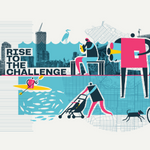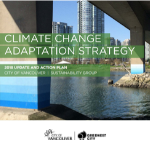
December 2022
IN THIS ISSUE
- Making home renovations more climate-friendly
- Reducing carbon pollution from lawn and garden tools in Metro Vancouver
- Facilitating climate action in your community
- Limiting waste in our food system
- Check out local events and green opportunities
NOTEWORTHY: City Council approved the 2023 Capital Budget on December 6 and referred decision on the 2023 Operating Budget to March 2023, after public engagement and Council priority setting, which will take place in the early part of next year. The draft current state budget includes short and long-term funding to support key City plans and priorities, such as advancing climate mitigation and adaptation work through our Climate Emergency Action Plan and Climate Change Adaptation Strategy. Learn more about the process and timeline here.
WHAT WEíRE READING: TransLink has released a three year Climate Action Plan, which builds on their Climate Action Strategy goal to become a climate-resilient and net-zero transit system by 2050. Find the highlights here, or dig into the full plan.

NEW CLIMATE-FRIENDLY HOME RETROFIT REGULATIONS TAKE EFFECT JANUARY 1
In Vancouver, there are approximately 80,000 detached houses. Also known as single family homes, these houses create about 28% of Vancouver's carbon pollution Ė nearly half a million tonnes of emissions per year - by burning natural gas, a fossil fuel, for heating and hot water. Fossil fuel-burning appliances create carbon monoxide, nitrogen oxide and particulate matter, which impacts air quality and our health, including increasing asthma and respiratory inflammation.
To reduce these emissions, and protect our health, new regulations are accelerating the switch to safer and more climate-friendly electric home heating and cooling options, like heat pumps. These systems not only lower carbon pollution from detached homes, but can also help to safeguard against heat and smoke events that are becoming more extreme and prevalent with climate change.
On January 1, 2023, two new regulations come into effect for home renovations in detached houses:
- For major home renovations over $250,000 in value, existing space heating and hot water systems must be replaced with electric versions
- Any air conditioning system (not including portable air conditioning units) installed in existing homes must also provide heating
These regulations promote the health and safety of residents, and advance our Climate Emergency Action Plan target to reduce Vancouverís carbon pollution by 50% by 2030.
YOUR TURN
You can find more information about these regulations here.
Looking for resources ahead of your home renovation? The City and its partners offer many supports for homeowners, including:
- Rebates and resources for detached home renovations
- Home energy coaching through the Home Energy Navigator program
SUPPORTING: CLIMATE EMERGENCY

REDUCING CARBON POLLUTION FROM LAWN AND GARDEN TOOLS IN METRO VANCOUVER
Did you know that gasoline and diesel lawn and garden tools produce carbon pollution that impacts our health, environment and climate? These tools, such as lawn mowers, leaf blowers, chainsaws and trimmers, are a significant source of regional air and carbon pollutants. They may be small, but they have a big impact: operating a commercial leaf blower for an hour creates as much pollution as driving a new vehicle 1700 kilometres.
Metro Vancouver is considering actions to reduce those emissions and to promote electric alternatives to lawn and garden equipment. These changes would support the regionís Clean Air Plan, a ten-year plan for managing air quality and carbon pollution, and Climate 2050, a strategy to transition Metro Vancouver to a low carbon, resilient region over the next 30 years.
YOUR TURN
Metro Vancouver would like to hear from you about your experience with these tools as they consider how to reduce emissions from the use of this equipment, you can provide feedback here until February 1, 2023.
SUPPORTING: CLIMATE EMERGENCY

SUPPORT GRASSROOTS CLIMATE ACTION IN YOUR COMMUNITY
UBC Forestryís Climate Action and Community Engagement (CACE) micro-certificate supports community leaders interested in engaging and training local climate champions. CACE grows the skills required to address the rapidly growing need for civic participation in climate action within communities vulnerable to climate change extremes.
Participants in the eight week online program will:
- Identify climate change causes, impacts, and solutions at the local level
- Design community outreach plans for local-scale climate action
- Facilitate fun, interactive and hands-on activities to engage community in climate conversations
- Participate in professional development opportunities and community engagement skill-building
YOUR TURN
Applications for the February to April 2023 cohort are now open. Learn more about the program and register here.
SUPPORTING: CLIMATE EMERGENCY

PREVENTING FOOD WASTE THROUGH INNOVATION
Using innovation and design processes, CFIL is experimenting with potential solutions to this challenge, which will support the City of Vancouverís goal to be a zero waste city by 2040.
YOUR TURN
Follow along with the CFIL through their bi-weekly blog posts as they explore what a circular food system in Vancouver could be.
How can you reduce food waste this holiday season?
- Grocers often remove produce that doesnít look aesthetically pleasing because consumers wonít buy it, so choose Ďimperfect produceí when itís available to show they donít need to throw it away
- Plan ahead for your meals and only buy the amount of ingredients you need for what you are making
- Save vegetable scraps and peels to make soup stock - give some to your friends and neighbours if youíre low on freezer space!

When attending in-person events please follow COVID-19 health & safety precautions.
Create Memories, Not Garbage
Ongoing
This holiday season, celebrate with less waste. Check out Metro Vancouverís tips for low-waste gift and wrapping ideas.
Online
Kits Village Plastic Recycling Depot
December 15
Drop off your clean, pre-sorted plastics at this free recycling event.
Kitsilano Community Centre
Stanley Park EcoStewards
December 21 and January 4
Volunteer with the EcoStewards to help manage and remove invasive plant species from the parkís ecosystem. In addition to removing invasive species, you will also learn about local ecology and conservation issues.
Stanley Park
Christmas Tree Chipping
January 7 and 8
Bring your live, cut Christmas tree for chipping and composting. Donations of cash and non-perishables are welcome and will be distributed to local charities.
Multiple locations
Farmerís Markets
Saturdays and Sundays
Winter markets are now open. Visit the website to learn about local farmers, food producers and creators at each market and plan your visit.
Riley Park & Hastings Park
Volunteering with the Bicycle Valet
Ongoing
The Bicycle Valetís volunteer team provides informative resources and valet-style parking at events in and around Vancouver. Join the team to support Vancouverís cycling community and get free entrance to events.
In person events, sign up online
Seasonal Farmerís Markets
Various
Riley Park and Hastings Park winter markets are now open. Visit the website to learn about local farmers, food producers and creators at each market and plan your visit.
Various
Streetwise Cycling Online
Any time
New to cycling? This free educational series from HUB helps adult beginner riders gain knowledge and skills to start their cycling journey at their own pace with confidence.
Online
SPEC Team Meetings
Various
Want to connect with other like-minded individuals and share your knowledge on energy and transportation, food growing, or waste? Check the link for Society Promoting Environmental Conservation meet-up topics and meeting dates.
Online
Connect and learn more
Vancouver.ca Twitter Facebook Talk Vancouver LinkedIn Instagram
City of Vancouver - 453 West 12th Avenue - Vancouver - BC - V5Y 1V4



